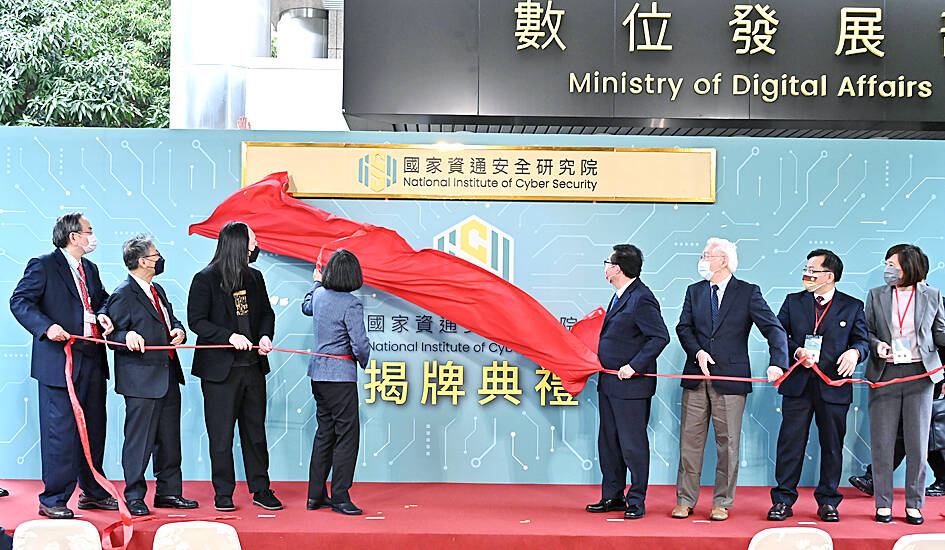The government is to propose a legislative amendment to impose heavier fines on private companies found guilty of leaking personal data, Vice Premier Cheng Wen-tsan (鄭文燦) said yesterday.
In addition, the government would establish an “independent watch mechanism” for better protection of personal data, Cheng said at an inauguration ceremony in Taipei for the National Institute of Cyber Security (NICS).
The proposed amendments to the Personal Data Protection Act (個人資料保護法) would increase the fines as soon as possible for personal data leaks by private companies, he said.

Photo: Tu Chien-jung, Taipei Times
Article 48 of the act allows for fines of NT$20,000 to NT$200,000 against companies that fail to prevent theft or disclosure of private data that they collect, or allow it to be compromised.
Cheng’s pledge to increase the penalties came one day after iRent, a Taiwanese vehicle-sharing platform, was fined NT$200,000 by the Directorate-General of Highways for leaking the personal data of about 400,000 people.
The Taipei City Government on Thursday issued a NT$90,000 fine to iRent, which is run by Ho Ing Mobility Service (和雲行動服務), a subsidiary of automotive conglomerate Hotai Motor Co (和泰汽車).
Cheng said that the highways authority’s fine was “too light,” and that the public and private sectors need to step up their efforts to improve protections of personal data.
At the ceremony, Minister of Digital Affairs Audrey Tang (唐鳳) also addressed the data protection issue, saying that the NICS would intervene in data leak incidents in the private sector and help companies tighten their cybersecurity systems.
The NICS, a public body established primarily to improve cybersecurity in Taiwan, would also seek to foster talent in that field, and develop advanced technologies and tools to protect the nation’s digital assets, Tang said.
Headed by Ho Chuan-te (何全德), who was previously in charge of cybersecurity at the Presidential Office, the NISC would play a pivotal role in reinforcing Taiwan’s digital environment, Tang said.
The NICS was set up under the Ministry of Digital Affairs in accordance with the Act for the Establishment of the National Institute of Cyber Security (國家資通安全研究院設置條例), which took effect at the start of this year.
President Tsai Ing-wen (蔡英文), who also attended the ceremony, said the establishment of the NICS was part of the government’s efforts to tackle ever-evolving cybersecurity threats from external forces.
“Information security is national security,” Tsai said, adding that the government needs to continue investing in Taiwan’s cybersecurity infrastructure.

CHAOS: Iranians took to the streets playing celebratory music after reports of Khamenei’s death on Saturday, while mourners also gathered in Tehran yesterday Iranian Supreme Leader Ayatollah Ali Khamenei was killed in a major attack on Iran launched by Israel and the US, throwing the future of the Islamic republic into doubt and raising the risk of regional instability. Iranian state television and the state-run IRNA news agency announced the 86-year-old’s death early yesterday. US President Donald Trump said it gave Iranians their “greatest chance” to “take back” their country. The announcements came after a joint US and Israeli aerial bombardment that targeted Iranian military and governmental sites. Trump said the “heavy and pinpoint bombing” would continue through the week or as long

TRUST: The KMT said it respected the US’ timing and considerations, and hoped it would continue to honor its commitments to helping Taiwan bolster its defenses and deterrence US President Donald Trump is delaying a multibillion-dollar arms sale to Taiwan to ensure his visit to Beijing is successful, a New York Times report said. The weapons sales package has stalled in the US Department of State, the report said, citing US officials it did not identify. The White House has told agencies not to push forward ahead of Trump’s meeting with Chinese President Xi Jinping (習近平), it said. The two last month held a phone call to discuss trade and geopolitical flashpoints ahead of the summit. Xi raised the Taiwan issue and urged the US to handle arms sales to

BIG SPENDERS: Foreign investors bought the most Taiwan equities since 2005, signaling confidence that an AI boom would continue to benefit chipmakers Taiwan Semiconductor Manufacturing Co’s (TSMC, 台積電) market capitalization swelled to US$2 trillion for the first time following a 4.25 percent rally in its American depositary receipts (ADR) overnight, putting the world’s biggest contract chipmaker sixth on the list of the world’s biggest companies by market capitalization, just behind Amazon.com Inc. The site CompaniesMarketcap.com ranked TSMC ahead of Saudi Aramco and Meta Platforms Inc. The Taiwanese company’s ADRs on Tuesday surged to US$385.75 on the New York Stock Exchange, as strong demand for artificial intelligence (AI) applications led to chip supply constraints and boost revenue growth to record-breaking levels. Each TSMC ADR represents

Pro-democracy media tycoon Jimmy Lai’s (黎智英) fraud conviction and prison sentence were yesterday overturned by a Hong Kong court, in a surprise legal decision that comes soon after Lai was jailed for 20 years on a separate national security charge. Judges Jeremy Poon (潘兆初), Anthea Pang (彭寶琴) and Derek Pang (彭偉昌) said in the judgement that they allowed the appeal from Lai, and another defendant in the case, to proceed, as a lower court judge had “erred.” “The Court of Appeal gave them leave to appeal against their conviction, allowed their appeals, quashed the convictions and set aside the sentences,” the judges